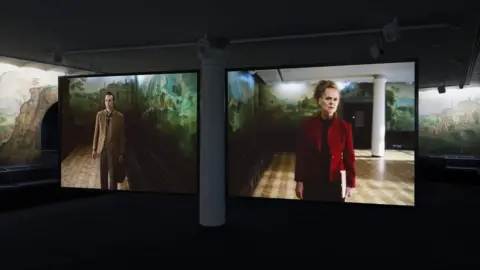Tate Britain unveils new counterpoint to offensive Rex Whistler mural
 Getty Images
Getty ImagesThe Tate Britain has unveiled a new work that seeks to contextualise a 1927 mural that has been sealed off from the public since 2020 for its use of racist imagery.
Viva Voce, a film by Keith Piper, has been installed next to Rex Whistler's painting, which includes depictions of black slaves on a leash and caricatures of Chinese figures.
The Tate said the film, which imagines an academic challenging Whistler about his mural, explores "the social and political context of 1920s Britain".
The 20-minute video piece also considers the time and place in which Whistler was working, discussing his social circle and their consumption of black jazz music.
It also includes archival footage of black soldiers during the First World War; and the notorious "Races in Residence" pavilion at the 1924 British Empire Exhibition.
The latter saw almost 300 people from colonised countries living on the exhibition grounds and providing demonstrations of native crafts - as though they were curiosities on display.
Piper is a multi-media artist and academic, who was part of the British Black Arts movement in the early 1980s.
He said it was important to interrogate the Whistler mural to understand how these images came to be created.
"As a teacher, I speak to young artists all the time, questioning them about their practice," he said.
"I want to give a sense of how and why the mural exists," he added.
 Tate / Joe Humphrys
Tate / Joe HumphrysSpeaking to The Guardian, he defended Tate Britain's decision to keep the mural rather than remove it.
"I know there is an argument among young people now that these images re-traumatise, but I think we either look or forget," he said.
"We are very good at forgetting nowadays and things that are out of sight go out of mind. To keep a clear sense of history we need to see these things.
'Unequivocally offensive'
Rex Whistler's mural, titled The Expedition in Pursuit of Rare Meat, was previously housed in a restaurant at Tate Britain.
In 2020, the Tate's ethics committee said they "were unequivocal in their view that the imagery of the work is offensive".
The room was subsequently shuttered during the pandemic and has not reopened since.
In 2022, it was announced the gallery would be commissioning an installation to "be exhibited alongside and in dialogue with the mural, reframing the way the space is experienced".
They said the work "should not be altered or removed", but noted the "uncomfortable juxtaposition of the mural and an eating space".
Tate Britain's director, Alex Farquhar son, said in 2022 the mural presented a "unique challenge".
He added: "The mural is part of our institutional and cultural history and we must take responsibility for it, but this new approach will also enable us to reflect the values and commitments we hold today and to bring new voices and ideas to the fore."
Zarina Muhammad and Gabrielle de la Puente, who make up art criticism duo The White Pube, previously told the BBC: "The mural does not need to be kept to be remembered; the mural certainly does not need to be continuously restored with millions of pounds worth of funding in order for us to discuss the problems within its imagery.
"We can still talk about the horrible things it stands for even after it is destroyed, and destruction isn't an end point. So it should go. Tate should stop defending it."
